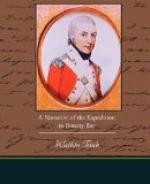Among other public buildings, I had almost forgot to mention an observatory, which stands near the middle of the town, and is tolerably well furnished with astronomical instruments. During our stay here, some Spanish and Portuguese mathematicians were endeavouring to determine the boundaries of the territories belonging to their respective crowns. Unhappily, however, for the cause of science, these gentleman have not hitherto been able to coincide in their accounts, so that very little information on this head, to be depended upon, could be gained. How far political motives may have caused this disagreement, I do not presume to decide; though it deserves notice, that the Portuguese accuse the Abbee de la Caille, who observed here by order of the King of France, of having laid down the longitude of this place forty-five miles too much to the eastward.
Until the year 1770, all the flour in the settlement was brought from Europe; but since that time the inhabitants have made so rapid a progress in raising grain, as to be able to supply themselves with it abundantly. The principal corn country lies around Rio Grande, in the latitude of 32 deg south, where wheat flourishes so luxuriantly, as to yield from seventy to eighty bushels for one. Coffee also, which they formerly received from Portugal, now grows in such plenty as to enable them to export considerable quantities of it. But the staple commodity of the country is sugar. That they have not, however, learnt the art of making palatable rum, the English troops in New South Wales can bear testimony; a large quantity, very ill flavoured, having been bought and shipped here for the use of the garrison of Port Jackson.
It was in 1771 that St. Salvador, which had for more than a century been the capital of Brazil, ceased to be so; and that the seat of Government was removed to St. Sebastian. The change took place on account of the colonial war, at that time carried on by the Courts of Lisbon and Madrid. And, indeed, were the object of security alone to determine the seat of Government, I know but few places better situated in that respect than the one I am describing; the natural strength of the country, joined to the difficulties which would attend an attack on the fortifications, being such as to render it very formidable.
It may be presumed that the Portuguese Government is well apprized of this circumstance and of the little risque they run in being deprived of so important a possession, else it will not be easy to penetrate the reasons which induce them to treat the troops who compose the garrison with such cruel negligence. Their regiments were ordered out with a promise of being relieved, and sent back to Europe at the end of three years, in conformity to which they settled all their domestic arrangements. But the faith of Government has been broken, and at the expiration of twenty years, all that is left to the remnant of these unfortunate men, is to suffer in submissive silence. I was one evening walking with a Portuguese officer, when this subject was started, and on my telling him, that such a breach of public honour to English troops would become a subject of parliamentary enquiry, he seized my hand with great eagerness, “Ah, Sir!” exclaimed he, “yours is a free country—we"!——His emotions spoke what his tongue refused.




